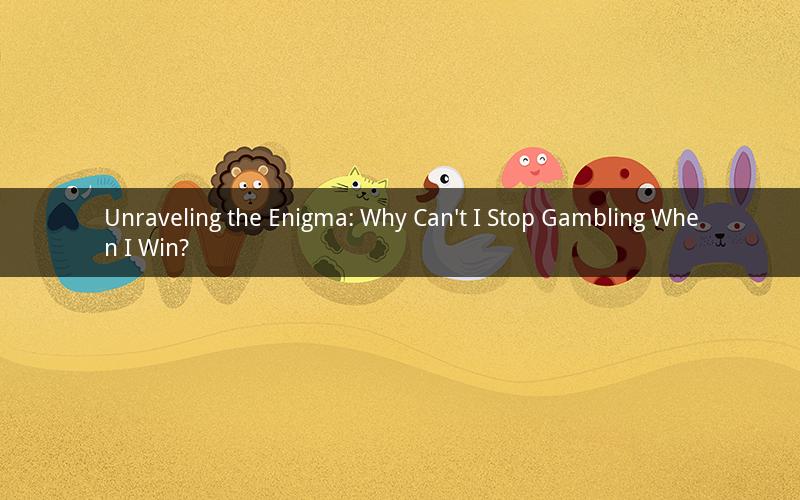
Introduction:
Gambling is an activity that can bring excitement, thrill, and even financial gains. However, for some individuals, it becomes an uncontrollable habit, even when they win. The question arises, why can't I stop gambling when I win? This article delves into the psychological and emotional factors that contribute to this behavior, providing insights into why it can be challenging to overcome.
1. The Psychological Factor:
One of the primary reasons why individuals find it difficult to stop gambling, even when they win, is the psychological aspect. The human brain is wired to seek pleasure and avoid pain. When gambling, the anticipation of winning activates the reward system in the brain, releasing dopamine, a neurotransmitter associated with pleasure and satisfaction.
a. Dopamine and the Reward System:
Dopamine is released in the brain when we experience pleasure, such as winning a lottery or hitting a jackpot. This neurotransmitter creates a feeling of euphoria and reinforces the behavior of gambling. When individuals win, the brain reinforces the desire to continue engaging in gambling to experience the same level of pleasure.
b. The Illusion of Control:
Gambling often provides individuals with a sense of control, as they believe they can influence the outcome of the game. This feeling of control can be addictive, making it difficult for individuals to stop gambling, even when they win. The illusion of control creates a psychological attachment to the activity, making it challenging to break free.
2. The Emotional Factor:
Emotions play a significant role in gambling addiction, particularly when it comes to stopping the behavior. Emotions such as anxiety, boredom, or stress can trigger the urge to gamble, even when individuals have won.
a. Emotional Distress:
Emotional distress, such as anxiety or stress, can lead individuals to seek refuge in gambling. When they win, the positive emotions experienced during the activity may reinforce the behavior, making it harder to stop. The relief of negative emotions can create a psychological association between gambling and emotional well-being, making it challenging to break the cycle.
b. Boredom and Routine:
Boredom or a lack of routine can also contribute to the difficulty of stopping gambling, even when individuals have won. Engaging in gambling becomes a form of entertainment or a way to fill time, making it difficult to resist the urge to continue.
3. Social and Environmental Factors:
Social and environmental factors can also play a role in why individuals find it challenging to stop gambling, even when they win.
a. Peer Pressure:
Peer pressure from friends or family members who engage in gambling can influence an individual's behavior. The desire to fit in or impress others may lead them to continue gambling, even when they have won.
b. Availability of Gambling Opportunities:
The ease of access to gambling opportunities, such as casinos or online platforms, can make it difficult for individuals to resist the temptation to continue gambling. The availability of these opportunities makes it easier to engage in the behavior, even when they have won.
4. Financial Consequences:
While the focus of this article is on the psychological and emotional factors, it is important to acknowledge the financial consequences of gambling addiction. Even when individuals win, the financial burden of gambling can be overwhelming, making it challenging to stop the behavior.
a. Losses and Debt:
Gambling addiction often leads to significant financial losses. Individuals may continue gambling in the hope of recouping their losses, leading to an unsustainable cycle of debt.
b. Impact on Finances:
The financial consequences of gambling addiction can extend beyond personal finances. It can affect relationships, employment, and overall well-being. The pressure to maintain a certain lifestyle or cover up financial problems can make it challenging for individuals to stop gambling, even when they have won.
Conclusion:
Understanding why individuals find it difficult to stop gambling, even when they win, requires examining the psychological, emotional, social, and environmental factors involved. The combination of dopamine-driven pleasure, emotional distress, social influences, and financial consequences creates a complex web of reasons that contribute to this addictive behavior. Recognizing these factors is crucial in developing effective strategies to overcome gambling addiction and regain control over one's life.
5 Questions and Answers:
1. Question: Can winning actually worsen gambling addiction?
Answer: Yes, winning can worsen gambling addiction. The positive emotions experienced during winning can reinforce the behavior, making it harder for individuals to stop gambling.
2. Question: Is there a way to break the cycle of gambling addiction?
Answer: Breaking the cycle of gambling addiction requires a combination of self-awareness, professional help, and support from loved ones. Seeking therapy, joining support groups, and developing healthier coping mechanisms are effective strategies.
3. Question: How can I manage my emotions to avoid relapse into gambling addiction?
Answer: Managing emotions involves identifying triggers and developing healthy coping mechanisms. Techniques such as mindfulness, relaxation exercises, and engaging in alternative activities can help manage emotions and reduce the urge to gamble.
4. Question: Can social support from friends and family help in overcoming gambling addiction?
Answer: Yes, social support from friends and family can be incredibly beneficial in overcoming gambling addiction. They can provide emotional support, hold individuals accountable, and offer practical assistance during the recovery process.
5. Question: Is it possible to completely stop gambling without professional help?
Answer: While it is possible to stop gambling without professional help, it can be challenging. Seeking guidance from a therapist or counselor can provide individuals with the necessary tools and support to overcome gambling addiction effectively.